- Home
- international
- news
- I spent 88 days in Russia's filtration system in Ukraine
I spent 88 days in Russia's filtration system in Ukraine

The Russian invasion of their country has forced all manner of difficulties on the Ukrainian people, with everyday life overturned for millions of people. One aspect of the invasion has been the creation of a vast filtration system, which has caused detentions, interrogations, and forced deportations for hundreds of thousands of — if not over a million — Ukrainians.
According to the US State Department, Russia interrogated, detained, or deported somewhere between 900,000 and 1.6 million Ukrainian citizens through July of this year. The United Nations Office of the United Nations High Commissioner for Human Rights has verified the existence of the security checkpoints and "arbitrary detention, torture, ill-treatment and forced disappearance" of Ukrainians perceived as being pro-Ukraine or with tenuous-at-best links to the armed forces.
One of those Ukrainians was Ihor Talalay, who has testified to his and others' experiences of harsh interrogations, squalid conditions, and arbitrary detention by Russian forces. He spent three months in the filtration system in the Donetsk region and has spoken out about what's happening to the Ukrainians who enter the system, and what life is like when you emerge from it.
Insider has adapted his story into this comic, 88 Days of Hell.
March 19, 2022. 8 a.m. Near the village of Chervone, Ukraine. I was trying to make it to Mariupol. A family with children were waiting for me to take them to Manhush. But that’s not what happened. I thought I would pass the checkpoint easily. They told me to get out of the car. Show what was in the trunk. He said: “What are these slippers you’re wearing? They look kind of suspicious.” I was wearing Uggies. They got fixated on my “suspicious” slippers. They suspected they were women’s shoes, and since I was a man I couldn’t wear them. Soviet sexism.: They said, “That’s it.” “You’re not going anywhere.”
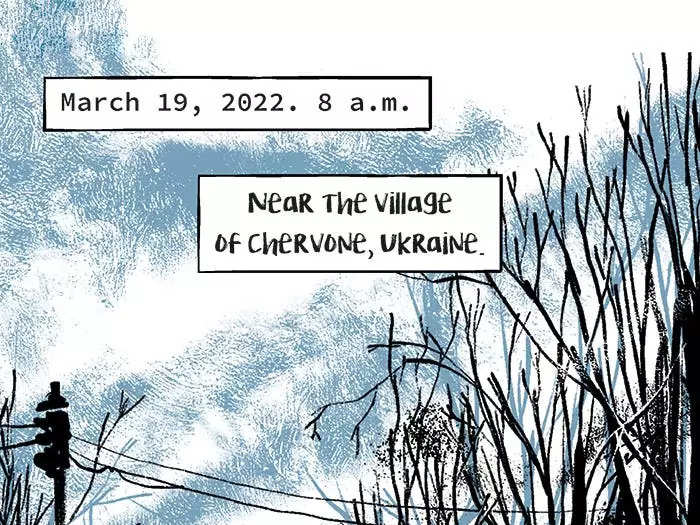
One month earlier. My name is Ihor Talalay. I’m 26. From the city of Dnipro in Ukraine. Before the war I worked for a furniture company. Studied English. Watched football. Sometimes played football. Did martial arts. Sometimes gave people free rides instead of taxis. February 24, 2022. The first day of the invasion I was in Kharkiv. We were building and installing a store. The house started booming. At first far away, then closer, closer, closer. The house started to shake. There was this metallic clatter like when a train car connects to a car loudly. But this one’s accompanied by a shaking of the ground. We packed up our things and went to Dnipro. I went to see my girlfriend. I hadn’t seen her in a couple weeks, so we did some fitness.
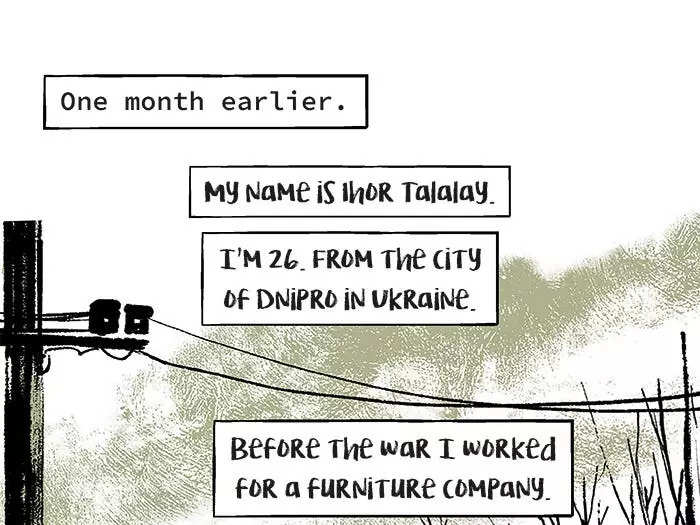
Early March. I wanted to be useful. I found volunteers who were evacuating people from Kharkiv to Dnipro. I joined them with my car, and started doing it too. Women. Children. Families. Those in trouble. And scared shitless. I then left to help bring people from Mariupol. March 18. The evacuation wasn’t well organized. My engine stalled. I slept in my car while waiting. Didn’t eat. And then I encountered the checkpoints. Nine of them. But this one, just outside Chervone, They said, “That’s it.” “You’re not going anywhere.”
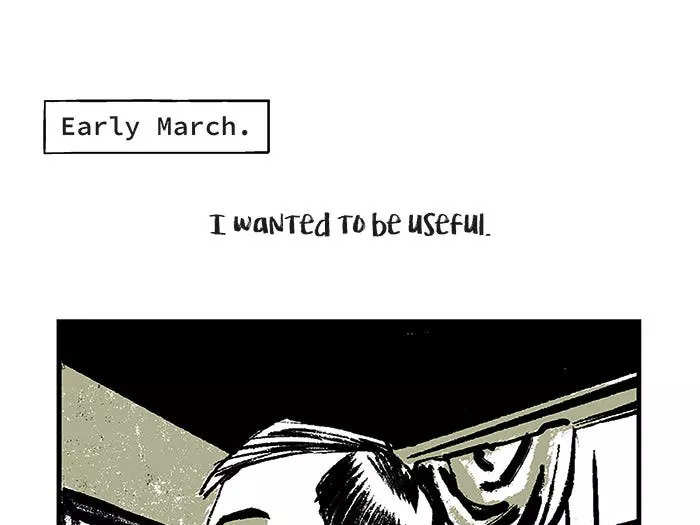
They drove me into the garage. And forced to take my clothes off. They started questioning me. I was put on my knees. They looked for tattoos that would show I was a member of the Ukrainian military. Then they beat me. “I’ll shoot you in the right knee and you’ll bleed out here!” They didn’t like that I stayed calm. They then threw me into the pit in the garage for repairing cars. I knew I had gotten into trouble, and I started losing it. But I quickly realized I needed to concentrate on the situation, not worry about what would happen in an hour or tomorrow. Only think about what was happening right now.
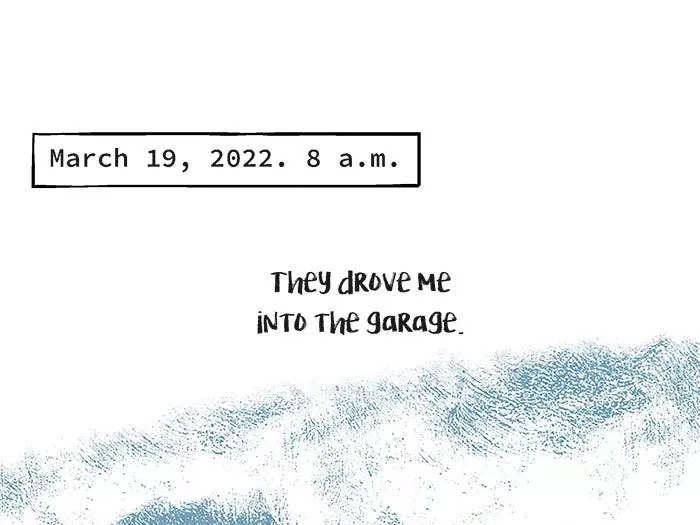
After several hours they took me and the others out. March 19. I worked to stay calm. They brought us to Manhush. I was kept on the street outside the police station all day. They finally brought me in. Another interrogation. They beat me some more. They pushed me to say I was in the military. “If you don’t, you’ll be able to get through filtration in 20 years.” I kept silent. They threw me in a cell. A cell around 3-by-3 meters. For 28 men. I was annoyed by the fact that everyone was whining. We spent the night standing. Hungry. Without water. Without a toilet. Waiting for something unknown.
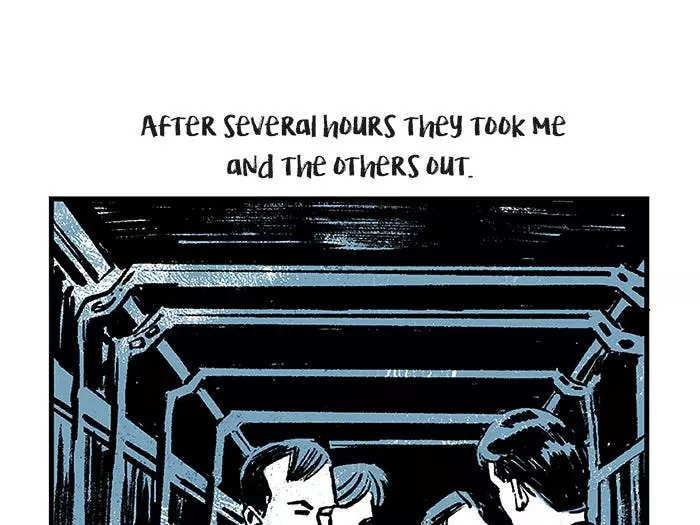
I was brought to Dokuchaevsk the next day. To a square that looked like it was from Soviet-era ‘60s. We stood next to the wall, and I thought: Damn, are they going to shoot us right here? Or will I die of hunger? They finally brought us into a cell. Same size as the one before. But thankfully only 15 men this time. I hadn’t eaten in three days. They finally brought food. A single slice of bread for each of us. And one bowl of soup that we all had to share. We were able to give the guard some money. He bought us some more food. Bread. Sausages. Chocolate. It was the food of the gods.
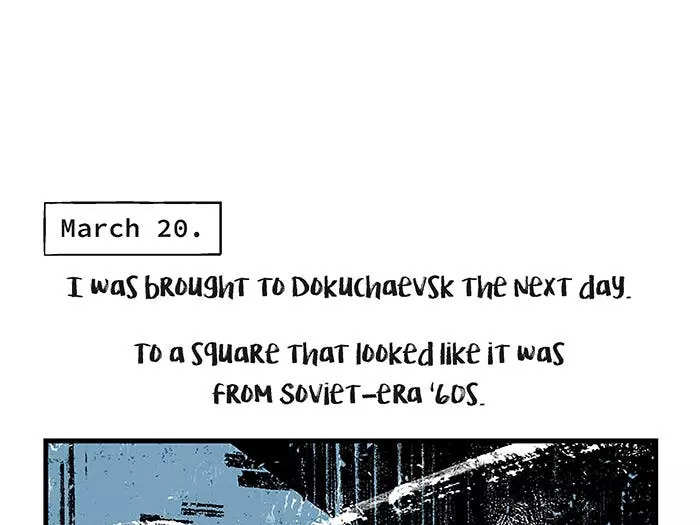
The next day we were taken to Donetsk. I was interrogated by the UBOP, the department for combating organized crime. Like your FBI. A shot of Ihor looking at someone off-panel. He’s very calm. No emotions. They again looked for anything that would mark me as Ukrainian military. Like tattoos. If you have a tattoo, you have to explain what it means.: They don’t understand a tattoo can be like an element of decor. Many people suffer because of it. I sat silently. And then WHUMP! WHUMP! WHUMP! They yelled: “What’s wrong with you? Does it hurt?” I was beaten before. But this time was for real.
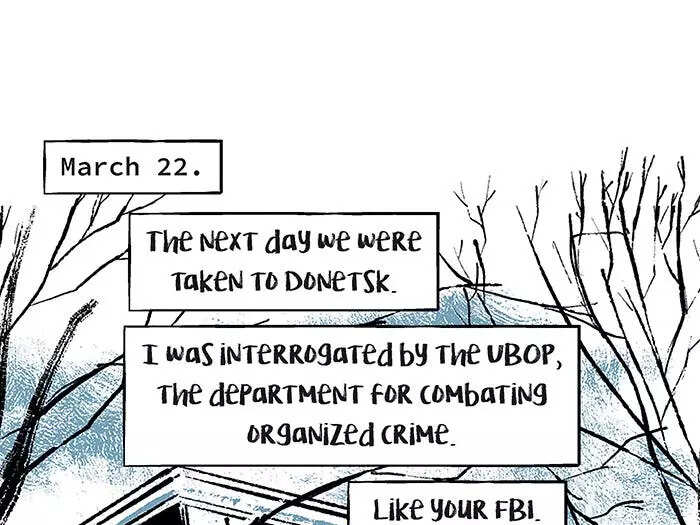
And then I was transferred to Olenivka. It was a temporary detention center. Cold. No water. No hygiene. We slept on wooden pallets on the floor. It had a very pro-Russian population. Even those who supported the Russian invasion were there. We would be told lies like “Kyiv has been taken.” I sang the Ukrainian national anthem to myself. Each barrack had four prisoners who were assigned as leaders. They would represent us to the guards. Hand out food to us. We called them “rats.” One of ours was this really skinny guy who loved having power over us. He had such a hysterical voice. Because he had some power he could express his thoughts freely, like call people a prison slang for homosexual. He was the kind of person you can’t actually do anything to, but in real life you’d just give him a smack in the face and he’d run away.
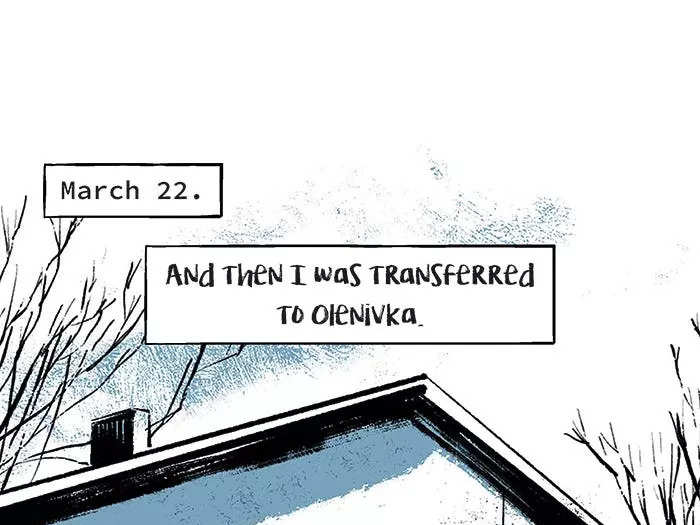
For two months the only outside world I saw was frosted glass. I learned to determine the hour by the way a shadow falls on the window. I made an improvised backgammon game. Using bread for the pieces. One dude had a high fever and passed out. He just lay there for three days. No one helped him. The guards said, “If he can make it, he will live. “But if he can’t, he will die.” One of the prisoners was a military man who fought near Donetsk in 2016. After he joined again after this invasion, his hands and feet were soaked in water, electric wires attached to them. But he woke up every morning with a smile on his face. Another one was a soldier from Teroboron who fell into a depression. I kept telling him to stay positive. He thanked me for my help. And when he left, told me he would tell my mother I was still alive. We all talked about our lives. And who would eat what when we’re released
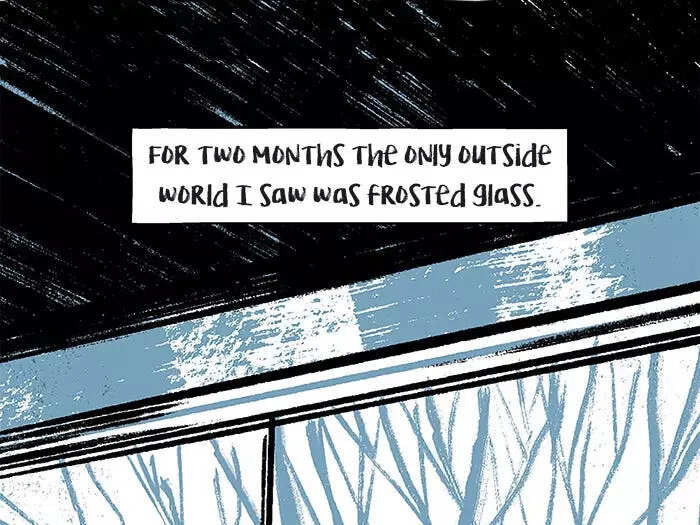
June 14. 88 days after Ihor’s detainment began. I was playing backgammon when the guard came to me and said, “Pick your stuff and go.” They gave me a paper, and I signed it. It said, “All charges are dropped.” I called my mom and said it was me. She said, “Prove it.” I needed to wait until the next morning to get all the documents. But I had nowhere to go. So I went back to the UBOP building. Got locked up overnight in one of the cells. I got the paperwork the next day. Threw me out on the streets. No money. No anything.
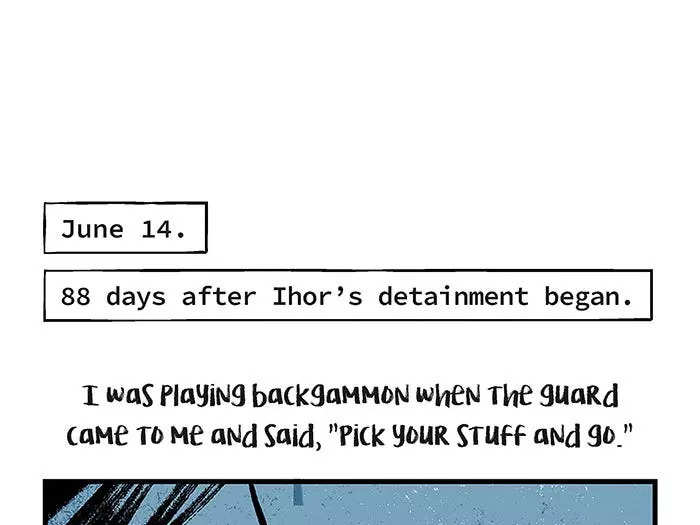
On June 27 I returned to Dnipro. I went to visit my girlfriend. She broke up with me. She said, “I’m not ready mentally and physically to be back with you.” I said, “OK.” Now there’s no such thing in life in which you can say you have a problem. I’m now looking to find myself. What I used to do is now really uninteresting. I want to do something big. I just don’t know what that’ll be, exactly. Or where. The End. This summer, the US cited estimates that as many as 1.6 million Ukrainians had been interrogated, detained, and forcibly deported to Russia since the war began. Including 260,000 children. Ihor is currently staying in Dnipro. And driving a Chevy Aveo.
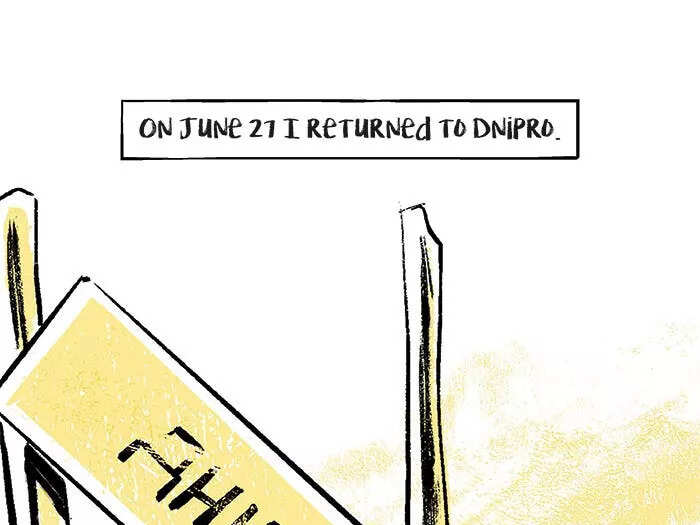
More comics from Insider:
I Escaped a Chinese Internment Camp, winner of 2022 Pulitzer Prize for Illustrated Reporting.
I was a pro soccer player. I was tricked into going to Qatar to work construction.
An Indian student activist spoke out about government discrimination. They demolished her house.
Popular Right Now
Advertisement